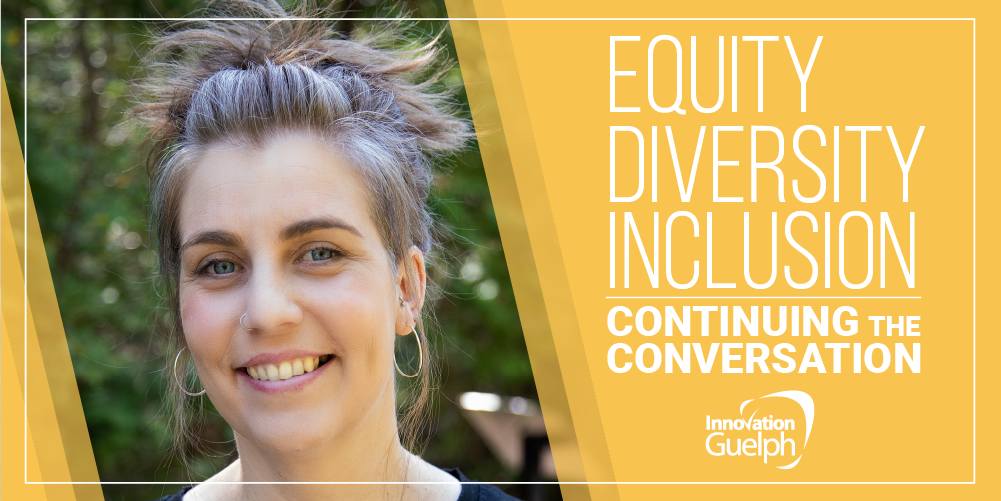Home » Continuing the Conversation – Branching Out
Continuing the Conversation – Branching Out

When clients are earning money, it can be life changing. “Often they’ve heard how there is not enough money for them with funding cuts or a family’s ability to provide extra programs or supports/activities – they now have fund to make choices” Van Ryn said. “There’s a freedom that comes from choice and it’s unbelievable what a difference it makes.”
Justice Dignity & Belonging
“Because of the work we do, EDI is a philosophical point in our business – our mission and vision is to create communities and belonging,” said Van Ryn. “We consider how inclusion can lead to belonging. Inclusion is defined as an action or behaviour – belonging is a philosophy!”
Van Ryn said that coming from a legacy of institutionalization, the pillars of justice, dignity and belonging have become essential.
“We are reframing diversity inclusion and dignity. We need diversity but then must provide dignity for those who live within a community,” she said. Equity is important but justice needs to be considered and present too.
“We feel this with neurodiversity, and we know inclusion isn’t enough; but we need that too,” she explained. And not just inclusion. “We don’t devalue what’s been done, she said, but what’s next is deepening community”
Branching Out’s programs operate with a lot of choice for their clients, caregivers, and community partners. That’s important because, “choice gives freedom and when you’re free, you can be included and advocate for yourself,” she said. “People with neurodiversity have an absence of dignity when they have no choice.”
Branching Out staff develop care and program plans with their clients. When they employ people with neurodiversity within CommonFare Kitchen they are creating purposeful work in valued social roles. “If people are non-speaking, it doesn’t mean non-thinking; we find ways to communicate.”
As support workers, she said they have experienced massive transformational shift. For instance, in personal care they now ask if they can help the client before starting the process. They don’t’ just assume it’s okay, respecting the clients’ right to consent and choice. As well, they always err on assuming competence, whether clients have genetic, developmental, brain injury, dementia, fetal alcohol syndrome etc. with the goal to have all people be comfortable.
As part of their mandate, Branching Out works to shift attitudes around inclusion and belonging to where it’s no longer remarkable but common place. As an example, inclusion is when a pool in town offers a special needs swim. However, belonging is when there is a public swim where people with special needs are welcome – normalized.
Creating Safe Spaces
While Van Ryn agrees it’s important for businesses to create safe spaces, she said education needs to happen along with access to affordable space. “Often this work is left to non-profits with limited funds,” she said. Spaces need to be open to all so people can show up with support workers and with neurotypical participants too – together.”
Barriers exist in the form of lack of:
- available space
- funding, and
- knowledge.
She said existing silos can also be barriers. Organizations need to be more open to help and collaboration and remove segregation, she said. In external business relationships Branching Out’s work creates connection. Suppliers are even more motivated upon learning about the work they do.
“When we talk about our work and the reasons why we are committed to this, people get on board and want to help in smaller ways and within their own businesses,” she said.
Boundless Accelerator
https://boundlessaccelerator.ca/
Boundless Accelerator™ offers unique programs and initiatives to support businesses from startup to scaleup for a strong, diverse, inclusive, sustainable economy. Since our inception in 2011 as Innovation Guelph, our award-winning programs have grown to serve 1,400+ entrepreneurs across Ontario and Canada who are building a strong, inclusive, equitable and sustainable economy. Accolades for our work include the University of Guelph’s Gordon S. Lang HeForShe Impact Award, the National Enterprise Support of the Year Award and the CANIE Enterprise Support of the Year award for advancing Canadian entrepreneurship through leadership and impact. Most recently, the Technology Councils of North America (TECNA) Innovation Awards recognized our i.d.e.a. Fund program for Innovation in Diversity, Equity & Inclusion. Boundless Accelerator™ connects entrepreneurs with Regional Innovation Centres in Ontario for additional resources and strives to partner with like-minded organizations across Canada to further support and guide our clients to success. Based in Guelph, Ontario, we are in the heart of the Toronto-Waterloo Innovation Corridor, striving to create a future where entrepreneurship knows no limits.


